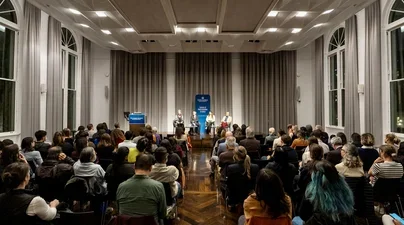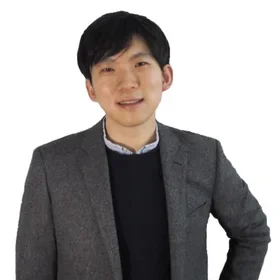The ocean is our planet's largest biosphere. It covers 70% of the Earth's surface, is home to up to 80% of all life, and is essential to regulating climate and supporting biodiversity. Yet despite its vital role, the ocean faces increasing threats from human activities. A recent panel discussion explored the urgent need to address these challenges and safeguard our planet's marine ecosystems.
The discussion, Future of Our Oceans: The Wave of Change, examined the importance of oceans when conducting conservation efforts and the role we all have in protecting and preserving ecosystems throughout the world's oceans and seas. The November 20 event was presented by Columbia’s M.S. in Sustainability Science program, and co-sponsored by Columbia’s M.S. in Sustainability Management program and the Lamont-Doherty Earth Observatory in partnership with the Coral Restoration Consortium and the Woods Hole Oceanographic Institution.
The event, moderated by Sonya Dyhrman, professor in the Department of Earth and Environmental Sciences at Columbia, featured Dr. Ajit Subramaniam, Lamont-Doherty Earth Observatory research professor; Dr. Tali Vardi, executive director of the Coral Restoration Consortium (CRC); and Richard Vevers, director of Room 71, Woods Hole Oceanographic Institution, and star of the Emmy-winning Netflix documentary Chasing Coral.

(l to r): Sonya Dyhrman, professor in the Department of Earth and Environmental Sciences at Columbia; Richard Vevers, director of Room 71, Woods Hole Oceanographic Institution; Dr. Tali Vardi, executive director of the Coral Restoration Consortium (CRC); and Dr. Ajit Subramaniam, Lamont-Doherty Earth Observatory research professor.
The three panelists entered ocean conservation through widely different paths. Vevers worked in advertising before realizing that oceans were his “happy place” and made a career change into underwater photography. Vardi was introduced to the concept of conservation in her early twenties and combined her love of swimming and science. Subramaniam grew up in a landlocked town in India, dreaming of being an oceanographer from the age of 10, but only pursued the academic field in his graduate studies.
Throughout the discussion, the conversation repeatedly returned to the phenomenon of “ocean blindness,” which ocean conservationists use to explain why people are not as focused on the future of our oceans as they should be. Vevers explained how many of us have a “terrestrial view of the world” that prevents us from really understanding the ocean. “The ocean isn’t what you would imagine,” he described, before pulling out a block of obsidian to show what the ocean is really like: heavy, black, three-dimensional, and freezing cold.
The speakers consistently emphasized the impact that oceans have on humankind. Vardi shared an anecdote from her experience studying coral reefs during her doctoral research, when her advisor explained that “it's all about the people,” emphasizing the idea that restoration efforts must remain centered around helping the people who have relied on these reefs for thousands of years. People have been living in oceanic communities for 50,000 years, with entire cultures and languages that revolve around ocean features. Subramaniam cited his personal experience working with a small Alaskan community where 70% of the protein comes from the waters around them and houses are built on now-melting ice, yet many rely on work in oil rigs to make a living. He explained how the climate problem is so complex because of issues like these: Those who are often the most affected by climate change are not the ones who created the problem.

Future of Our Oceans: The Wave of Change panelists discussed the urgent need to safeguard our planet's marine ecosystems at the November 20 event at Pulitzer Hall.
Uplifting the voices of those affected, as well as supporting scientists in communicating their findings effectively, are key priorities for the future of ocean conservation. Mitigation strategies, while necessary, will only do so much. “If we don’t reduce emissions, nothing else matters. … We don’t need to wait to see what is happening, because it already is,” Subramaniam explained. While science collaborating with business is essential for saving the planet, “if only market forces drive emissions cuts and not science, it will get worse.”
“The ocean will be just fine,” Vardi said. “It’s us and how much tolerance we have for losing ecosystems, food, homes, cultures, and dealing with climate refugees.”
About the Programs
The Columbia University M.S. in Sustainability Science program, offered by the School of Professional Studies in partnership with the Climate School, prepares students for management and leadership positions in which they help organizations address environmental impacts. Students learn strategies to respond to the ever-changing environment and predict future environmental changes—and the impact on the public.
The fall 2025 application priority deadline for the M.S. in Sustainability Science program is January 15. The final deadline is May 1. Learn more about the program here.
The Columbia University M.S. in Sustainability Management program, offered by the School of Professional Studies in partnership with the Climate School, provides students cutting-edge policy and management tools they can use to help public and private organizations and governments address environmental impacts and risks, pollution control, and remediation to achieve sustainability.
The fall 2025 application priority deadline for the M.S. in Sustainability Management program is January 15. The final deadline is May 1. Learn more about the program here.


